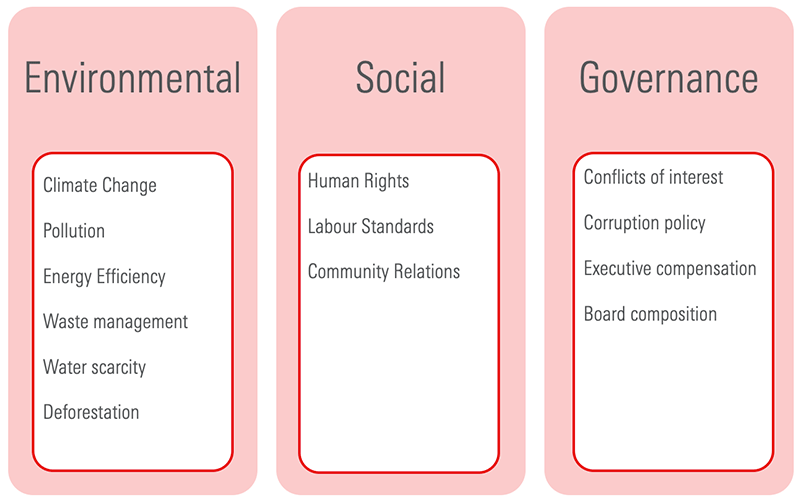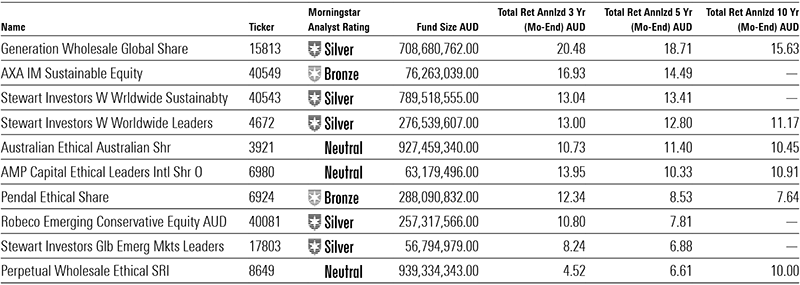Fund Spy: Question marks hang over Australian ethical funds
The performance of some Australian stock funds with tilts toward environmental, social and governance objectives lags their non-ESG equivalents.
Mentioned: Generation Global Share (15813), CFS Aikya Emerging Markets Opportunities (17803), Pendal Australian Share (2726), Australian Ethical Australian Shr (3921), Robeco Emerging Conservative Equity AUD (40081), Stewart Investors Worldwide Sust (40543), AXA IM Sustainable Equity (40549), Stewart Worldwide Leaders Sustainability (4672), Pendal Horizon Sustainable Aus Shr (6924), AMP Ethical Leaders International Shr O (6980), Pendal Sustainable Australian Share (8409), Perpetual ESG Australia Share (8649), Aristocrat Leisure Ltd (ALL)
The performance of some Australian stock funds with tilts toward environmental, social and governance objectives lags their non-ESG equivalents.
Even as many global ethical funds outperform, or at least match, the returns of their non-ESG counterparts, the same pattern isn't playing out for these Australian strategies.
Returns from Pendal Australian Share (2726) have surpassed both Pendal Ethical Share (6924) and Pendal Sustainable Australian Share (8409) across three-, five- and 10-year periods.
Led by respected portfolio manager Crispin Murray, the Morningstar Gold Medal-rated Pendal Australian Share fund returned 12.64 per cent, 8.35 per cent and 8.06 per cent over three, five and 10 years.
By comparison, Bronze Medallist Pendal Ethical Share – also led by Murray – returned 11.13, 8.53 and 7.64 per cent.
Pendal Sustainable Australian Share, which is not part of Morningstar's research coverage and is run by Rajinder Singh, underperformed further still with returns of 10.9 per cent, 7.45 per cent and 7.6 per cent over the same timeframes.
Morningstar manager research analyst Donna Lopata notes that the relative performance of ESG-focused strategies can suffer when excluded companies outperform – gaming company Aristocrat Leisure (ASX: ALL) is one example.
The limited universe of names means fewer opportunities to beat the benchmark. Even so, Pendal Ethical Share kept pace with its S&P/ASX 200 benchmark and outperformed its rivals in the large-blend Morningstar Category.
A greater concentration of sectors and companies listed in Australia is regularly highlighted by Morningstar and other investment commentators – and manager research analysts Lopata and Andrew Miles point to similar reasons in the case of ESG fund underperformance.
On the other hand, on a global basis, ESG funds are showing equivalent non-ESG funds a clean pair of heels in the performance stakes.
How do Aussie ESG funds stack up?
A recent cut of Morningstar data on UK funds showed clear outperformance of the ethically minded versions, as discussed by Morningstar UK editor Holly Black in September.
"The figures put paid to the concerns many investors have that investing sustainably means compromising on returns,” Black writes.
"Indeed, in five of the six fund duos analysed by [funds distributor] interactive investor, the ethical offering outperformed over one and three years."
This aligns with the broader view espoused by Morningstar's ESG spokesman Jon Hale.
In a recent article, he exploded some of the myths about sustainable funds, including relative underperformance and higher costs of ESG funds versus non-ESG funds.
"This myth got started around the turn of the century when many socially responsible investing funds were run by small asset managers that charged higher fees," he says.
Hale's 2017 analysis of fees across all US sustainable open-end funds compared with their peers found an even spread of costs falling within Morningstar's low and high rankings.
And since then, the costs have fallen further, partly in response to the rise of sustainable ETFs.

But investors shouldn't ignore ESG
We're hearing a lot more about environmental, social and governance issues in the financial world, and companies realise they can't close their eyes to them.
When people such as Jeremy Grantham, co-founder of fund manager GMO, dedicate so much of their time and money to speaking about ethical investing, investors pay attention.
Morningstar's Lopata, speaking at Morningstar's Individual Investor Conference last month, spoke about the changing tone of warnings about environment, social and governance for the investment world.
She refers to the Reserve Bank of Australia's recent financial stability report, which directly linked financial risk to climate change. "Their warning to investors and institutions to take account of and manage climate change risk, needs to be heard," Lopata said.
And given large parts of NSW and Queensland are grappling with bushfires, the RBA's point about insurance claims for natural disasters has a loud ring of truth.
"What stands out most to me is their reference to insurance claims for natural disasters in the current decade having been more than double those in the previous one," Lopata said.
On the social front – which includes human rights and community relations – she refers to the Modern Slavery Act, including Australia's version, which was rolled out last year to formally outlaw human rights breaches such as child labour and detainment of workers.
The financial and reputational risk of poor governance is perhaps most clearly demonstrated by the banking royal commission that culminated in billions of dollars in fines and reparations for Australia's largest financial institutions.
In line with the shifting narrative on ESG, Morningstar has revamped its sustainability rating system in the past couple of weeks. Morningstar’s globe ratings system, which is underpinned by company-level analysis from Sustainalytics, has been widened in the way it assesses Australian companies. This includes a more accurate measure of material risk, which is reflected in Morningstar's ESG rating of funds.

As before, five globes remains the highest Morningstar ESG ranking. A managed fund or ETF with this ranking is one that best manages material sustainability risks in its category.
Globe ratings are useful for comparing potential investments, whether they are intentionally labelled as sustainable or otherwise.
Morningstar takes three main steps to reach its globe rating:
- It examines the total portfolio holdings for a Fund or ETF and aggregate its company-level risk scores into a current Sustainability Score.
- Next it calculates its historical sustainability score based on the trailing 12 months.
- Lastly, those results are normally distributed relative to its Morningstar Global Category.

Source: Morningstar Direct
Though not all funds employ exclusions, some of the above funds specifically rule out holding stocks that are involved in industries such as adult entertainment, alcohol, animal testing and controversial weapons and armaments.

